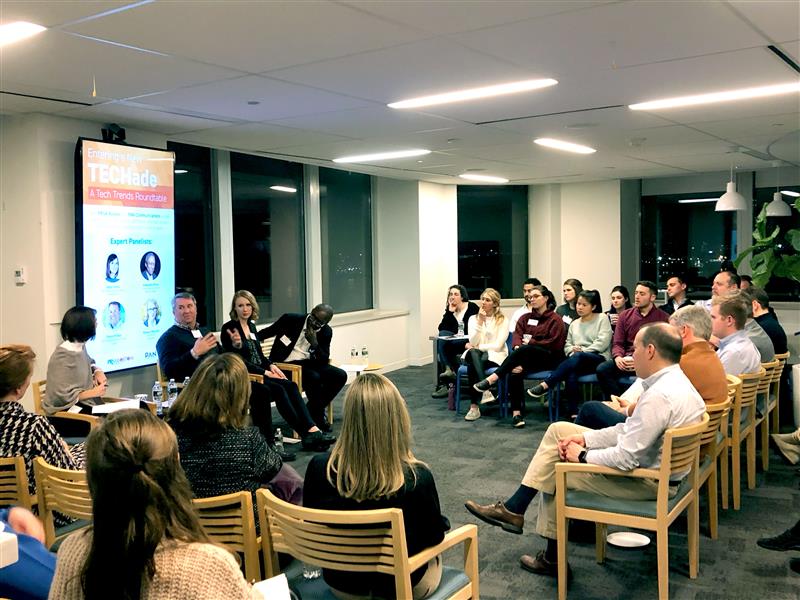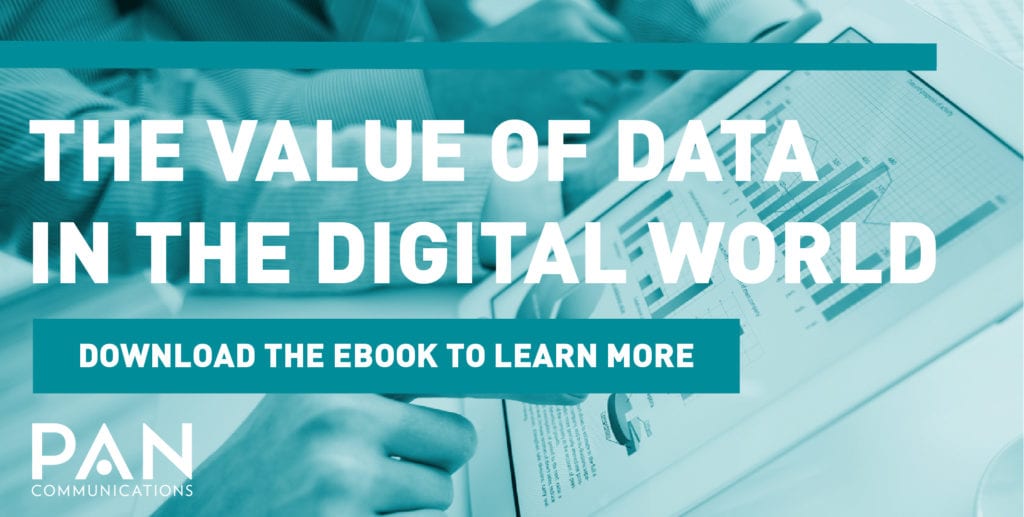What kinds of cool things are companies doing with robotics? Are consumers really worried about technology invading their privacy? And which industries stand to lose the most jobs due to automation?
These are a few of the topics experts kicked around during a recent PRSA communications panel hosted by PAN Communications. The panel, “Entering a New TECHade: A Tech Trends Expert Roundtable,” featured insights from a pair of reporters, Boston Globe technology columnist Hiawatha Bray and BostInno staff writer Rowan Walrath, and a tech marketing leader, Steve Kraus of Cogito.
Moderated by PAN SVP Nikki Festa O’Brien, the hour-long discussion touched on a variety of topics connected to business and tech – everything from the Coronavirus to GDPR to machine learning algorithms to a periodontics startup’s machines that preserve organs for transplant. Panelists offered their views on the evolving tech landscape, and some of the three dozen audience members weighed in with questions focusing on technology ethics, information transparency and reporters’ processes for pursuing stories.

Bray said his job focus has changed radically since he started covering tech at the Globe back in 1995. In the early days of the internet, before cloud computing and artificial intelligence (AI) became household terms, he said, his stories highlighted technology breakthroughs more than the practical applications specific technologies enabled.
“When I started out doing my job, everything was ‘Gee whiz, wow!’ You can’t write about it anymore like it’s ‘Gee whiz, wow,’” Bray said. “Now (tech) is integrated  into the fabric of our lives. What I find myself writing about more and more, and what we should keep writing about, is what you (PR) guys are hearing from your clients, what they’re developing and how that is likely to affect how we live among each other.”
into the fabric of our lives. What I find myself writing about more and more, and what we should keep writing about, is what you (PR) guys are hearing from your clients, what they’re developing and how that is likely to affect how we live among each other.”
Asked to highlight sectors that are hotbeds for innovation, BostInno’s Walrath pointed to insurance technology and robotics. InsurTech, she said, is taking off in Greater Boston – evidenced by the large number of venture capital deals she reports each week. Robotics, meanwhile, is generating news with both futuristic and practical use cases.
“There are all these different robots in the area that are doing really fascinating stuff,” she said. “There’s a Roomba that can weed your garden for you. I’m always curious about innovation in that space.”
“We’re the world center for so-called logistics robots,” Bray added. “It’s the most boring thing in the world – until you find that companies can’t find warehouse workers. These robots aren’t taking jobs away – they’re doing jobs that nobody wants to do. It’s almost like Amazon set off a bomb here by buying Kiva Systems (in 2012). All these people who fled Kiva Systems are off starting all these other robot companies to try to fill that vacuum. Now we’ve become really hot in that department.”
Artificial intelligence was a popular topic at the TECHade event. Panelists described the technology as having both positive and negative impacts on society.
Cogito’s Kraus discussed AI from a user’s perspective. Cogito, a PAN client based in Boston, helps call centers improve the quality of interactions by detecting human signals and providing behavioral guidance to agents. Cogito uses machine learning, a subset of AI, to improve the performance of its software.
“We’re trying to augment the process – to make (agents) better, more professional,” he said. “It helps us a lot too. It puts the human in the loop for AI. It makes them perform better. It helps the software learn and get better over time, so it keeps helping itself.”
On the flip side, Bray noted that he’s seen reports that AI applications could automate out thousands of legal jobs by reviewing case law much faster than humans can.
“You don’t need humans to find relevant cases,” he said. “This is something that computers do better. That’s going to get rid of countless jobs. That’s the really scary stuff. As AI becomes more capable, the jobs it supplants aren’t the warehouse jobs – they’re the jobs that used to require thinking. I think people are panicked about that. It isn’t happening overnight, but it’s happening, and it’s going to keep happening.”
“At the end of day,” Walrath added, “it’s going to be a policy question. If the unemployment rate really does rise (because of AI), something will need to change on the regulatory level.”
Privacy is another complicated issue. Panelists said companies, governments and the general public will continue to grapple with ethical challenges about information sharing and tracking practices.
“It’s hard because where does that end?” Cogito’s Kraus said. “Let’s say they track (people that may have contracted) the Coronavirus and now I can’t get health insurance. How do you govern the usage of that information? It becomes a slippery slope.”
Bray said he’s shocked by consumers’ willingness to share information and cede their privacy to get access to the latest technology. For example, he said, people are clamoring to rent “smart apartments” with electronic door locks that track residents movements in and out of their residences.
“That’s a risk of privacy. You look at survey data, and a great number of people say, ‘Oh, I love that. I want one of those,’” Bray said. “And they’ll even pay extra rent to live in a place that has that cool tech in it. The fact is this is a really interesting problem. (Facebook CEO) Mark Zuckerberg has been saying this all along – many people who say they’re concerned about privacy aren’t really concerned about privacy. (Journalists) do have a duty to explain to them this information and the implications. It often startles me how they say, ‘Oh, I still want one.’”



